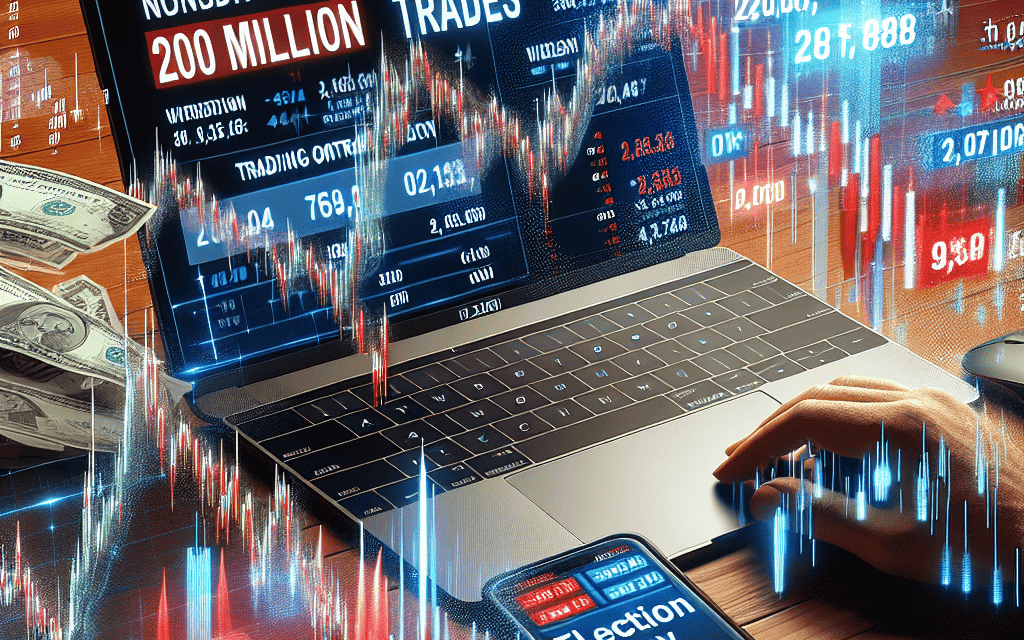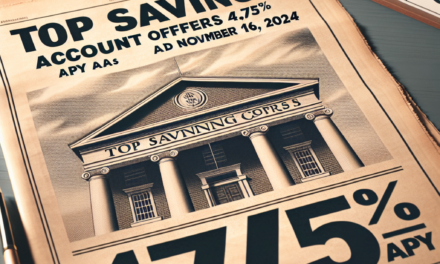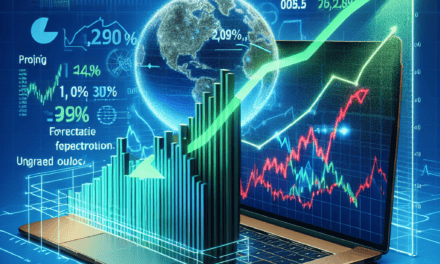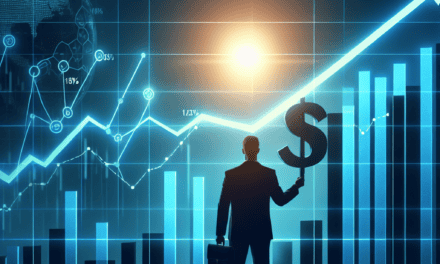“Robinhood’s Election Contracts: Powering Democracy with 200 Million Trades on Election Day!”
Introduction
On Election Day, Robinhood’s innovative election contracts platform reached a significant milestone, surpassing 200 million trades. This achievement underscores the growing interest and engagement of retail investors in political events and their potential market impacts. Robinhood’s user-friendly interface and commission-free trading have democratized access to financial markets, allowing a broader audience to participate in speculative trading around electoral outcomes. The surge in trading volume highlights the platform’s role in shaping modern investment strategies, as users seek to capitalize on the volatility and opportunities presented by the electoral process.
Impact Of Robinhood’s Election Contracts On Market Dynamics
Robinhood’s election contracts reaching 200 million trades on Election Day marks a significant milestone in the realm of financial markets, underscoring the profound impact of retail trading platforms on market dynamics. This achievement not only highlights the growing influence of retail investors but also raises questions about the implications of such trading activities on market stability and efficiency. As Robinhood continues to democratize access to financial markets, the surge in election contract trades reflects a broader trend of increased retail participation in complex financial instruments.
The introduction of election contracts by Robinhood has provided retail investors with a novel way to engage with political events, allowing them to speculate on election outcomes. This innovation has democratized access to a market that was previously dominated by institutional investors, thereby leveling the playing field. The sheer volume of trades on Election Day indicates a heightened interest among retail investors in political events and their potential impact on financial markets. This surge in trading activity can be attributed to the accessibility and user-friendly interface of Robinhood’s platform, which has attracted a new generation of investors eager to participate in market movements.
Moreover, the impact of Robinhood’s election contracts on market dynamics extends beyond mere participation. The influx of retail investors has introduced new liquidity into the market, which can enhance price discovery and reduce bid-ask spreads. However, it also raises concerns about market volatility, as retail investors may react more impulsively to news and events, leading to rapid price fluctuations. This increased volatility can pose challenges for market makers and institutional investors, who must navigate the unpredictable nature of retail-driven market movements.
In addition to liquidity and volatility, the rise of election contracts has implications for market sentiment and investor behavior. The ability to trade on political outcomes allows investors to express their views on the potential impact of elections on economic policies and market conditions. This can lead to shifts in market sentiment, as investors adjust their portfolios based on perceived risks and opportunities associated with different election scenarios. Consequently, the trading of election contracts can serve as a barometer for investor sentiment, providing valuable insights into market expectations and potential future trends.
Furthermore, the success of Robinhood’s election contracts highlights the evolving landscape of financial markets, where technology and innovation continue to reshape traditional trading paradigms. The integration of political events into financial markets through election contracts represents a convergence of finance and politics, blurring the lines between these two domains. This convergence underscores the need for regulatory frameworks that can adapt to the changing nature of financial markets, ensuring that they remain fair, transparent, and resilient in the face of new challenges.
In conclusion, Robinhood’s election contracts reaching 200 million trades on Election Day signifies a pivotal moment in the evolution of financial markets. The increased participation of retail investors in complex financial instruments has introduced new dynamics into the market, influencing liquidity, volatility, and sentiment. As the financial landscape continues to evolve, it is essential for market participants and regulators to understand and adapt to these changes, ensuring that the benefits of increased retail participation are realized while mitigating potential risks. The future of financial markets will undoubtedly be shaped by the continued interplay between technology, innovation, and investor behavior, with platforms like Robinhood at the forefront of this transformation.
Analyzing The Surge: 200 Million Trades On Election Day
On Election Day, Robinhood’s election contracts reached an unprecedented milestone, with 200 million trades executed. This remarkable surge in trading activity underscores the growing intersection between politics and financial markets, as well as the increasing interest of retail investors in political events. The phenomenon can be attributed to several factors, including heightened political engagement, the accessibility of trading platforms, and the evolving nature of financial instruments.
To begin with, the surge in trades on Election Day reflects a broader trend of increased political engagement among the general populace. In recent years, political events have become more closely scrutinized, with their outcomes having significant implications for economic policies and market dynamics. Consequently, investors are keen to capitalize on the potential market volatility that accompanies such events. This heightened awareness and interest in political developments have translated into a more active participation in election-related financial instruments.
Moreover, the accessibility of trading platforms like Robinhood has democratized the investment landscape, allowing a wider audience to engage in trading activities. Robinhood, in particular, has been at the forefront of this transformation, offering commission-free trades and an intuitive user interface that appeals to novice and seasoned investors alike. The platform’s user-friendly design and low barriers to entry have empowered individuals to participate in financial markets, thereby contributing to the surge in trading volumes observed on Election Day.
In addition to accessibility, the evolution of financial instruments has played a crucial role in driving the surge in trades. Election contracts, a relatively new addition to the suite of financial products available to investors, offer a unique opportunity to speculate on the outcomes of political events. These contracts allow investors to place bets on various election-related scenarios, such as the winning party or candidate, thereby providing a direct link between political developments and financial markets. The introduction of such instruments has not only expanded the range of investment options but also heightened the appeal of trading during politically significant events.
Furthermore, the surge in trades can be attributed to the increasing sophistication of retail investors. With the proliferation of financial education resources and the availability of real-time market data, retail investors are better equipped to make informed decisions. This growing knowledge base has enabled them to navigate the complexities of election contracts and leverage their insights to capitalize on market opportunities. As a result, retail investors are playing a more prominent role in driving trading volumes, particularly during high-stakes events like elections.
In conclusion, the 200 million trades executed on Election Day through Robinhood’s election contracts highlight the dynamic interplay between politics and financial markets. The surge in trading activity can be attributed to heightened political engagement, the accessibility of trading platforms, the evolution of financial instruments, and the increasing sophistication of retail investors. As political events continue to exert a significant influence on market dynamics, it is likely that the popularity of election-related financial instruments will persist, further blurring the lines between politics and finance. This trend underscores the importance of understanding the implications of political developments on financial markets and the need for investors to remain vigilant in navigating this complex landscape.
Robinhood’s Role In Shaping Election Day Trading Trends
On Election Day, Robinhood, the popular trading platform known for its user-friendly interface and commission-free trades, reached a significant milestone as its election contracts surpassed 200 million trades. This achievement underscores the platform’s growing influence in shaping trading trends during pivotal national events. As the political landscape becomes increasingly intertwined with financial markets, Robinhood’s role in facilitating access to election-related financial instruments has become more pronounced.
The surge in trading activity on Election Day can be attributed to several factors. Primarily, the heightened political uncertainty surrounding elections often leads to increased market volatility, which traders seek to capitalize on. Robinhood’s election contracts, which allow users to speculate on the outcomes of various political races, provide a unique opportunity for investors to engage with the market in a manner directly linked to political events. This innovative approach has attracted a diverse range of traders, from seasoned investors to novices eager to explore the intersection of politics and finance.
Moreover, Robinhood’s platform is particularly appealing to younger investors, who are more likely to be engaged with current events and interested in leveraging their political insights for financial gain. The platform’s intuitive design and educational resources empower these users to make informed decisions, thereby democratizing access to complex financial instruments that were once the domain of institutional investors. This democratization is further enhanced by Robinhood’s commitment to transparency and its efforts to provide real-time data and analysis, enabling users to respond swiftly to market changes.
In addition to its user-centric features, Robinhood’s success in reaching 200 million trades on Election Day is also a testament to its strategic positioning within the broader financial ecosystem. By offering election contracts, Robinhood has tapped into a niche market that aligns with the growing trend of event-driven trading. This approach not only differentiates the platform from its competitors but also positions it as a leader in the evolving landscape of retail trading. As more investors seek to incorporate macroeconomic and geopolitical factors into their trading strategies, Robinhood’s election contracts offer a compelling avenue for engagement.
Furthermore, the platform’s ability to handle such a high volume of trades on a single day highlights its robust technological infrastructure. Ensuring seamless execution and maintaining system stability during periods of intense activity are critical for retaining user trust and confidence. Robinhood’s performance on Election Day demonstrates its capacity to meet these demands, reinforcing its reputation as a reliable and efficient trading platform.
As Robinhood continues to expand its offerings and adapt to the changing needs of its user base, its influence on election day trading trends is likely to grow. The platform’s success in reaching 200 million trades not only reflects its current impact but also signals its potential to shape future market dynamics. By providing accessible and innovative financial products, Robinhood is poised to play a pivotal role in the ongoing convergence of politics and finance, offering investors new opportunities to navigate the complexities of the modern market landscape.
In conclusion, Robinhood’s achievement of 200 million trades on Election Day marks a significant milestone in its journey as a transformative force in the trading world. Through its election contracts, the platform has successfully engaged a diverse audience, capitalized on market volatility, and demonstrated its technological prowess. As the relationship between politics and finance continues to evolve, Robinhood’s role in shaping election day trading trends will undoubtedly remain a focal point for investors and market observers alike.
The Rise Of Election Contracts: A New Era In Trading
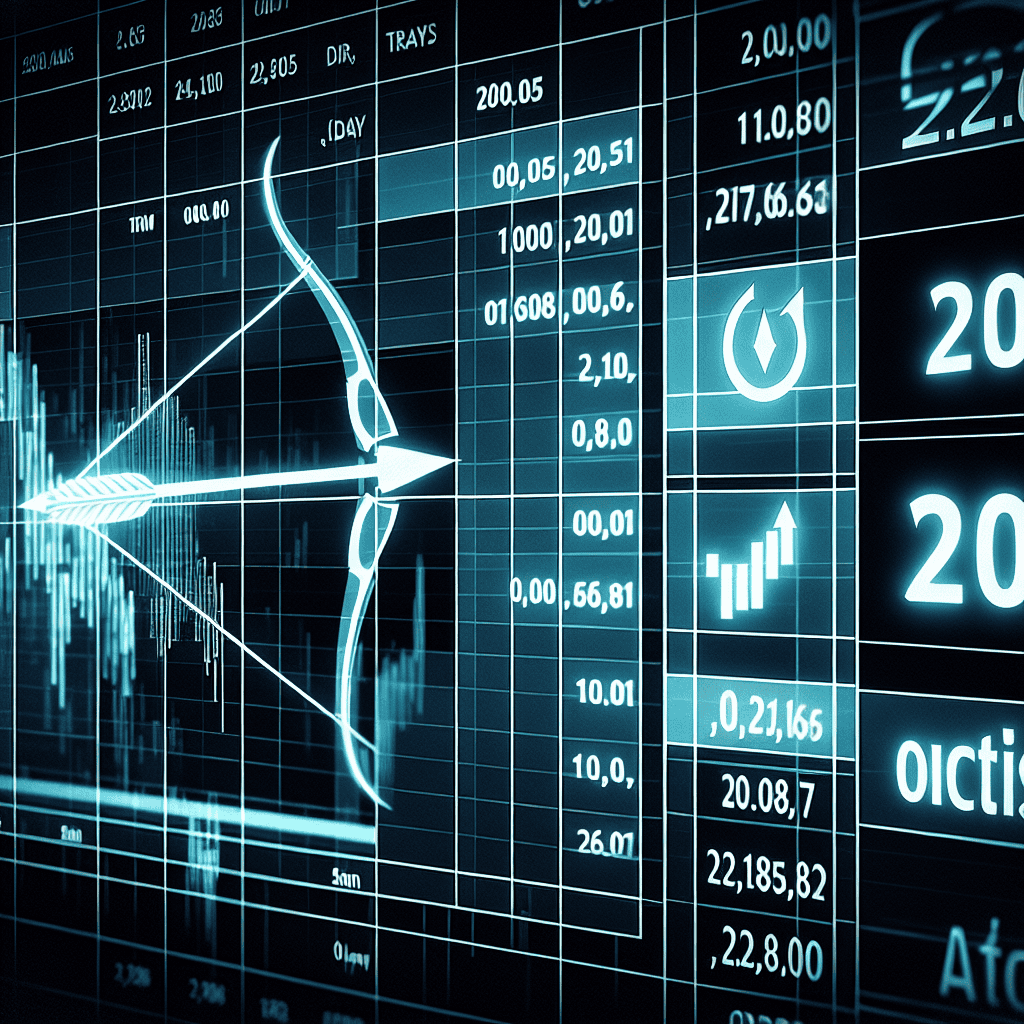
The rise of election contracts as a novel trading instrument has marked a significant shift in the financial markets, capturing the attention of both seasoned investors and newcomers alike. On Election Day, Robinhood, a prominent trading platform, reported a staggering 200 million trades in election contracts, underscoring the growing popularity and influence of this innovative financial product. This milestone not only highlights the increasing interest in political events as market drivers but also reflects a broader trend towards more dynamic and responsive trading strategies.
Election contracts, essentially derivatives that allow traders to speculate on the outcomes of political events, have emerged as a compelling option for those looking to diversify their portfolios. Unlike traditional stocks or bonds, these contracts are directly tied to the probabilities of specific electoral outcomes, offering a unique opportunity to capitalize on political volatility. As such, they have attracted a diverse range of participants, from hedge funds seeking to hedge against political risk to individual investors eager to engage with the political landscape in a financially meaningful way.
The surge in election contract trading on platforms like Robinhood can be attributed to several factors. Firstly, the increasing polarization and unpredictability of political events have heightened interest in instruments that can provide financial returns based on political outcomes. This has been particularly evident in recent years, where elections have often resulted in unexpected results, thereby creating significant market movements. Consequently, traders are keen to leverage these opportunities, using election contracts as a means to gain exposure to political risk without directly investing in traditional assets that may be affected by such events.
Moreover, the accessibility and user-friendly nature of platforms like Robinhood have democratized trading, enabling a broader audience to participate in complex financial markets. The platform’s intuitive interface and commission-free trading model have lowered the barriers to entry, allowing individuals who may have previously been deterred by the complexities of traditional trading to engage with election contracts. This democratization has not only increased the volume of trades but has also contributed to a more diverse and dynamic trading environment.
In addition to accessibility, the real-time nature of election contract trading has appealed to those who thrive on the immediacy of market reactions. As political events unfold, traders can quickly adjust their positions, responding to new information and shifting probabilities. This agility is particularly attractive in the context of elections, where developments can rapidly alter the landscape and influence market sentiment. The ability to react swiftly to such changes provides traders with a distinct advantage, allowing them to capitalize on short-term fluctuations and optimize their strategies.
While the rise of election contracts represents a significant evolution in trading, it also raises important considerations regarding risk management and market stability. The speculative nature of these instruments means that they can be highly volatile, with the potential for substantial gains or losses. As such, traders must exercise caution and employ robust risk management strategies to navigate the inherent uncertainties of political markets. Furthermore, regulators may need to consider the implications of this growing trend, ensuring that appropriate safeguards are in place to protect investors and maintain market integrity.
In conclusion, the achievement of 200 million trades in election contracts on Robinhood’s platform on Election Day signifies a new era in trading, characterized by increased engagement with political events and a shift towards more dynamic and responsive investment strategies. As election contracts continue to gain traction, they are likely to play an increasingly prominent role in the financial markets, offering both opportunities and challenges for traders and regulators alike.
How Robinhood’s Election Contracts Influenced Voter Sentiment
Robinhood’s election contracts have emerged as a significant force in shaping voter sentiment, reaching an impressive milestone of 200 million trades on Election Day. This remarkable achievement underscores the growing influence of financial markets on political landscapes, as well as the increasing engagement of retail investors in the democratic process. As the lines between finance and politics continue to blur, it is essential to explore how these election contracts have influenced voter sentiment and the broader implications for democracy.
To begin with, Robinhood’s election contracts have provided a novel platform for individuals to express their political opinions through financial instruments. By allowing users to trade contracts based on the predicted outcomes of elections, Robinhood has effectively transformed political speculation into a market-driven activity. This has not only democratized access to political forecasting but also empowered retail investors to participate in a domain traditionally dominated by institutional players. Consequently, the surge in trading activity on Election Day reflects a heightened level of political engagement among the general populace, as individuals seek to leverage their financial acumen to influence and respond to electoral outcomes.
Moreover, the widespread participation in election contracts has had a profound impact on voter sentiment. As individuals engage with these financial instruments, they are compelled to consider a range of factors that may influence election results, such as economic indicators, public opinion polls, and political developments. This process of analysis and decision-making fosters a more informed electorate, as participants are encouraged to critically evaluate the potential consequences of their trades. In turn, this heightened awareness can lead to more nuanced perspectives on political issues, as voters become more attuned to the complexities of the electoral landscape.
In addition to fostering a more informed electorate, Robinhood’s election contracts have also contributed to a sense of agency among participants. By providing a platform for individuals to express their political preferences through financial means, these contracts have enabled users to feel more connected to the democratic process. This sense of empowerment can have a positive impact on voter sentiment, as individuals perceive themselves as active contributors to the political discourse. Furthermore, the ability to profit from accurate predictions can serve as an incentive for individuals to engage more deeply with political issues, thereby fostering a more vibrant and participatory democracy.
However, it is important to acknowledge the potential risks associated with the intersection of finance and politics. The speculative nature of election contracts may lead to increased volatility in financial markets, as traders react to political developments in real-time. This could have destabilizing effects on the broader economy, particularly if market movements are driven by misinformation or irrational exuberance. Additionally, the commodification of political outcomes raises ethical concerns, as it may incentivize individuals to prioritize financial gain over civic responsibility.
In conclusion, Robinhood’s election contracts have played a significant role in shaping voter sentiment by democratizing access to political forecasting and fostering a more informed and engaged electorate. While these financial instruments offer a unique avenue for individuals to participate in the democratic process, it is crucial to remain vigilant about the potential risks and ethical considerations associated with their use. As the relationship between finance and politics continues to evolve, it is imperative to strike a balance that preserves the integrity of democratic institutions while embracing the opportunities for increased civic engagement.
The Future Of Election Contracts In Financial Markets
Robinhood’s election contracts reaching 200 million trades on Election Day marks a significant milestone in the evolution of financial markets. This achievement not only underscores the growing interest in political events as financial instruments but also highlights the potential for election contracts to become a staple in the portfolios of both retail and institutional investors. As the financial landscape continues to evolve, the integration of political events into trading platforms like Robinhood suggests a broader trend towards the diversification of investment opportunities.
The concept of election contracts is not entirely new, but their recent surge in popularity can be attributed to several factors. Firstly, the increasing polarization of political landscapes globally has heightened the stakes of electoral outcomes, making them more relevant to market participants. Investors are keenly aware that election results can have profound implications on economic policies, regulatory environments, and international relations. Consequently, election contracts offer a mechanism for investors to hedge against or capitalize on these potential changes.
Moreover, the rise of technology-driven trading platforms has democratized access to financial markets, allowing a broader audience to participate in complex trading strategies. Robinhood, with its user-friendly interface and commission-free trading model, has been at the forefront of this movement. By offering election contracts, Robinhood has tapped into a niche market that appeals to both seasoned traders and newcomers eager to explore innovative financial products. This accessibility has undoubtedly contributed to the impressive volume of trades observed on Election Day.
In addition to accessibility, the appeal of election contracts lies in their ability to provide a real-time reflection of market sentiment regarding political events. Unlike traditional financial instruments, which may be influenced by a myriad of factors, election contracts are directly tied to specific electoral outcomes. This direct correlation allows investors to make more informed decisions based on their predictions of political events. Furthermore, the dynamic nature of election contracts, which can fluctuate significantly as new information becomes available, adds an element of excitement and immediacy to trading.
However, the burgeoning popularity of election contracts also raises important questions about their impact on financial markets and the broader economy. Critics argue that the speculative nature of these contracts could lead to increased volatility, as traders react to political developments with heightened sensitivity. Additionally, there are concerns about the ethical implications of commodifying political events, as it may encourage a focus on short-term gains rather than long-term stability.
Despite these concerns, the potential benefits of election contracts cannot be overlooked. They offer a unique opportunity for investors to diversify their portfolios and manage risk in an increasingly uncertain world. As financial markets continue to adapt to the complexities of the modern era, election contracts may serve as a valuable tool for navigating the intersection of politics and economics.
Looking ahead, the future of election contracts in financial markets appears promising. As more platforms recognize the demand for these instruments, it is likely that we will see further innovation and expansion in this area. Regulatory frameworks will need to evolve in tandem to ensure that these markets operate fairly and transparently. Ultimately, the success of Robinhood’s election contracts on Election Day is a testament to the growing importance of political events in the financial world, and it signals a new era of investment opportunities that are both challenging and rewarding.
Lessons Learned From Robinhood’s Election Day Trading Boom
Robinhood’s Election Day trading boom, marked by the platform reaching an astonishing 200 million trades in election contracts, offers a wealth of insights into the dynamics of modern financial markets and the behavior of retail investors. This unprecedented surge in trading activity underscores the growing influence of retail investors in shaping market trends and highlights the evolving landscape of financial technology platforms. As we delve into the lessons learned from this remarkable event, it becomes evident that several key factors contributed to this trading frenzy.
Firstly, the accessibility and user-friendly interface of Robinhood played a pivotal role in attracting a diverse range of investors, many of whom were participating in financial markets for the first time. The platform’s commission-free trading model democratized access to financial markets, enabling individuals to engage in trading activities without the burden of traditional brokerage fees. This accessibility, coupled with the excitement surrounding the election, created a perfect storm for heightened trading activity. Moreover, the integration of educational resources and real-time data within the app empowered users to make informed decisions, further fueling their engagement.
In addition to accessibility, the role of social media and online communities cannot be overlooked. Platforms such as Reddit and Twitter have become influential spaces where retail investors share insights, strategies, and predictions. During the election period, these platforms were abuzz with discussions about potential market movements, encouraging more individuals to participate in trading activities. The viral nature of information on social media amplified the impact of these discussions, leading to a surge in trading volumes as investors sought to capitalize on perceived opportunities.
Furthermore, the psychological aspect of trading during a high-stakes event like an election cannot be underestimated. The anticipation and uncertainty surrounding election outcomes often lead to increased market volatility, which, in turn, attracts traders looking to profit from short-term price fluctuations. Robinhood’s user base, characterized by a younger demographic, is particularly inclined towards risk-taking behavior, making them more likely to engage in speculative trading during such periods. This inclination towards risk, combined with the thrill of participating in a significant national event, contributed to the record-breaking trading volumes observed on Election Day.
However, the trading boom also highlighted some challenges and areas for improvement. The sheer volume of trades tested the platform’s infrastructure, leading to occasional technical glitches and delays. This underscores the importance of robust technological systems capable of handling surges in activity, especially during critical events. Additionally, the rapid influx of new investors raises questions about the adequacy of financial literacy among retail traders. While Robinhood provides educational resources, the complexity of financial markets necessitates a deeper understanding to ensure that investors are making informed decisions rather than succumbing to impulsive trading.
In conclusion, Robinhood’s Election Day trading boom serves as a testament to the transformative impact of financial technology on retail investing. The lessons learned from this event emphasize the importance of accessibility, the influence of social media, and the psychological factors driving investor behavior. As financial markets continue to evolve, platforms like Robinhood must adapt to meet the demands of an increasingly engaged and diverse investor base. By addressing the challenges highlighted during this trading surge, Robinhood and similar platforms can continue to empower retail investors while ensuring the stability and integrity of financial markets.
Q&A
1. **What are Robinhood’s Election Contracts?**
Robinhood’s Election Contracts are financial instruments that allow users to speculate on the outcomes of political elections.
2. **How many trades were made on Election Day?**
On Election Day, 200 million trades were made involving Robinhood’s Election Contracts.
3. **What is the significance of reaching 200 million trades?**
Reaching 200 million trades signifies a high level of user engagement and interest in political event-based trading on the Robinhood platform.
4. **What impact did this trading volume have on Robinhood?**
The high trading volume likely increased Robinhood’s transaction revenue and highlighted the platform’s capacity to handle large-scale trading activity.
5. **How does Robinhood benefit from Election Contracts?**
Robinhood benefits from Election Contracts through transaction fees, increased user engagement, and attracting new users interested in political event trading.
6. **What risks are associated with trading Election Contracts?**
Risks include market volatility, potential financial loss, and the unpredictability of election outcomes affecting contract values.
7. **How do Election Contracts differ from traditional stock trading?**
Election Contracts differ from traditional stock trading as they are based on political events rather than company performance, and their value is tied to the outcome of specific elections.
Conclusion
Robinhood’s Election Contracts reaching 200 million trades on Election Day signifies a substantial level of engagement and interest among retail investors in political events and their potential market impacts. This milestone highlights the growing trend of retail participation in financial markets, facilitated by platforms like Robinhood that offer accessible and user-friendly trading options. The high volume of trades underscores the increasing influence of political developments on market dynamics and the importance of providing investors with tools to hedge or speculate on election outcomes. This event also reflects the broader democratization of trading, where individual investors are empowered to actively participate in market activities traditionally dominated by institutional players.

